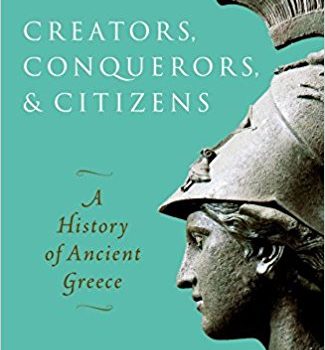January Book Review: Creators, Conquerors, & Citizens
 For those who want to know more about the history of ancient Greece, but are unsure of where to start, scholar and author, Robin Waterfield, has put together a comprehensive account the social, cultural, political, and military history of this region.
For those who want to know more about the history of ancient Greece, but are unsure of where to start, scholar and author, Robin Waterfield, has put together a comprehensive account the social, cultural, political, and military history of this region.
It is a 544 page behemoth book, but it’s been made manageable by separating the contents into three major sections: Archaic (750–480 BC), Classical (479–323 BC), and Hellenistic (323–30). The book then drills down to the important events, people, and ideologies that underpinned each period. What makes the book captivating and not dry – as some books of this nature tend to be – is that it’s not a just rote, chronological retelling of events; Waterfield presents new viewpoints, arguments, and scholarship for consideration, while providing interesting anecdotes along the way to make this tome a rather pleasurable read.
What is also interesting is that the book helps the reader understand the ancient Greek mindset. It will come as surprise to those new to ancient Greek history that there was no place officially known as ‘ancient Greece’. The sense of one unified nation was completely foreign to the people living then. Instead, there was a pervasive sense of loyalty to a city–state, or region. Ancient Greece was never truly unified in the modern sense, because every city-state vied for power and fought other city states (basically, Greeks fighting Greeks). Waterfield demonstrates the rise and fall of each of these poleis, and their various attempts at forming alliances that eventually fizzled out, or were upended by a new political reality. This micro-loyalty to one’s city-state was the norm, rather than the exception. Our modern concept of a national identity bound together by a shared language, culture and land wasn’t shared by the ancient Greeks. What was also remarkable, was that one’s identity could easily shift over their lifetime, at one point favouring the city, at another, aligning oneself to the region, depending on circumstances such as war or political upheaval.
Creators, Conquerors, & Citizens also makes an excellent resource. Waterfield provides an extensive glossary of terms at the back of the book for readers new to ancient Greek history, or for those who want to a quick refresher. There is also a chapter-by-chapter Recommended Reading for anyone interested in further research. This is invaluable for people starting out in ancient Greek history, or for scholars curious about the latest works on the subject.
Waterfield has a lot of ground to cover here - over 700 years of history. While it might seem like a daunting task, he manages to pull it off in a book that is suited for academics and general readers alike. If you want to add an invaluable resource on ancient Greece to your book shelves, Creators, Conquerors, & Citizens will make a solid addition to your collection.
